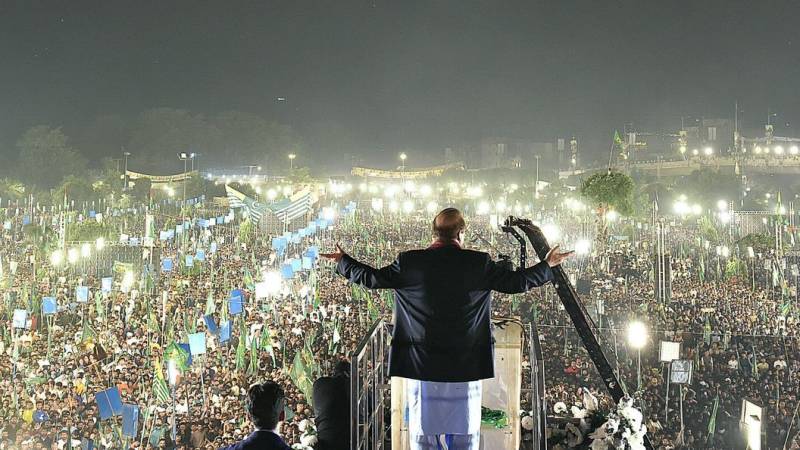By: Agha Haider Raza
I came across a Twitter thread sent to me the other day, highlighting snippets from a book. One particular quote from the thread stood out. “Corruption was rampant, with massive thievery of state property, including illegal tapping of electricity.” “Friendship, especially political ones, determined who got what.” Surely, I thought to myself, the author must be writing about the current state of affairs Pakistan. Today, the country’s economy is in shambles, finance minister Ishaq Dar is gallivanting around the world in an attempt to restructure and refinance Pakistan’s debt, Moody has downgraded Pakistan’s credit rating while inflation in the country hovers around 20%.
The snippets were from Lee Kuan Yew’s book, From Third World to First, written back in 2000 on his observations of Pakistan from the early 1990s. He was shocked at hearing only 21 percent of the Pakistan’s budget was allocated for administering the country, while the remaining amount was prioritized defense and debt restructuring.
Despite the passing of decades, these problems have only exacerbated, bringing Pakistan to the mercy of global financial institutions and rich countries. The country’s economic and political crises have been staring the country in the face for years, but little has been done by our politicians to resolve or attempt to correct course. With roughly 35 years of military rule, and sporadic civilian governance, Pakistan craves democratic stability. The dirty politics of the 1990s culminated in the imposition of martial law, ensuring that the dominating Pakistan military continued to remain in power. With the return of a democratic government after elections in 2008, it was hoped that the military would keep itself at bay. Unfortunately, meddling by the military establishment could not be curtailed. In 2011, Imran Khan relished the opportunity to work with the military to find a path to become Pakistan’s prime minister.
Imran Khan – Prime Minister of Pakistan
With the military paving the path, Khan won the 2018 elections and started his reign as the country’s 30th prime minister. Khan’s tumultuous tenure was rigged with political victimization, media censorship, and a sheer obsession of locking up political opponents. Khan’s inexperience of public office saw multiple changes within his cabinet, including four different finance ministers within his first three years in office. Not known to be diplomatic, Khan bungled foreign relations with key allies including Saudi Arabia, the United Arab Emirates and most importantly, China. Despite the military’s desire to thaw relations with India, Khan stood steadfast on his desire to forego any dealings with his neighbor. With the economy tanking, rampant inflation, and poor governance, the military pulled their support. Khan was forced to relinquish office after he lost a vote of confidence in parliament.
Spewing venom, Khan took the streets, selling a narrative that the new government was ‘imported’ by the US and military top brass, blaming the United States for orchestrating his departure after colluding with generals of Pakistan’s army. The problem with this narrative is that not only is it simply not true, Khan has reignited a suppressed anti-American sentiment to bolster his claims, while charge sheeting military generals of treason.
The only fortunate part of this narrative – like his predecessors Nawaz Sharif and Benazir Bhutto – Khan seems to have come to the realization that the military must not have a role in political engineering (unless they support him!). Absolving himself from accountability during his tenure, Khan has hinted it was the military who actually controlled power, forcing him to take unpopular decisions. But Khan has also admitted he used the military and the influential ISI to coerce politicians for various purposes including ensuring their presence in parliament for passing legislation and key votes.
It is certainly welcoming that Khan has realized the country’s powerful military should be kept at bay and not allowed to engineer Pakistan’s political landscape. For far too long the political class has allowed itself to be used as pawns and puppets, dancing to the tune of those blowing the trumpet from Rawalpindi. The problem however is that Imran Khan needs to tend to Pakistan’s economy, and not obsess over arresting his political rivals. The country has barely avoided default, and is teetering on the brink of an economic collapse. The current financial team seems to be running around Washington, DC like headless chickens, the country is immensely polarized, calamity has struck with floods wreaking havoc across Pakistan while the political elite refuse to have any meaningful economic policy debate or discourse.
Pakistan’s Economic Challenges
Pakistan has a huge population which is only growing. More than sixty percent of the country’s population is under the age of 30. Education metrics are extremely poor, Pakistan has a meager export industry with minimum focus on expanding its manufacturing sector. Despite being subsidized, the agriculture sector has one of the lowest yields of crop in the region with hardly any seed development or research over the past few decades. Many look for a quick buck in the real estate industry, by parking money in land holdings, contributing zilch to the country’s GDP. Pakistan relies heavily on imports, but hardly has any foreign exchange reserves to keep up with its purchase bill. To further compound problems, the country faces an acute energy crisis, relying on expensive non-renewable sources.
With such serious issues staring the country in the face, the political rulers are busy playing musical chairs for the prized prime minister seat in Islamabad. The military needs to stop toying with technocrats by imposing their own finance minister. Enough of the scripted politics and backroom deals. Short term gains will not help Pakistan. A country of 230 million people desperately requires stability, with a laser sharp focus on establishing strong economic fundamentals. Such stability can only take place when the military is not allowed to engineer Pakistan’s political landscape anymore.
Agha Haider Raza tweets at @ahraza_

